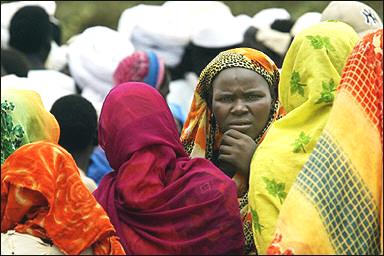Thousands will die in Darfur without military-backed relief effort : WHO

GENEVA, July 1 (AFP) — About 10,000 more people are likely to die over the coming month in Sudan’s strife-ridden Darfur region unless a massive international aid operation with military logistics gets off the ground swiftly, a global health official said.
“We anticipate that if things go ahead as they are at the moment, 10,000 people will die in the next month,” the World Health Organisation’s top emergencies expert, David Nabarro, said after visiting the region in western Sudan.
Nabarro estimated that a “strong and effective” relief operation could bring the death rate down to about 3,000 a month, which would be more in keeping with other emergencies.
Nabarro, who earlier briefed UN Secretary General Kofi Annan before his visit to Darfur on Thursday, emphasized that huge logistics and air support were needed to tackle the threat of cholera, dysentery and malaria among 1.2 million displaced people.
“The scale of operation in terms of personnel, helicopters, trucks, communications is really way beyond what we the UN can ourselves do,” he said, pointing out that logistics in crises in the Balkans, East Timor or Afghanistan had been provided by an international military force.
“It’s bigger than the Balkans and it’s bigger than Afghanistan,” Nabarro added.
“Somehow, we the United Nations have to build an infrastructure that’s big enough to give the basic needs for life to a million people plus in awful locations in an area the size of France.”
Annan was likely to announce a 90-day plan to deliver aid to the region after wrapping up his visit to Darfur, UN officials said.
Nabarro outlined a threatened cycle of diarrheal disease two to three weeks into the onset of the rainy season, which is beginning, followed by cholera emerging at four weeks, and dysentery setting in two to three weeks later.
But the health official said a worst case scenario of up to 300,000 deaths due to cholera, mentioned by the UN in recent months, was likely to be averted thanks to the efforts of private relief agencies.
About 900,000 of the displaced are spread across 130 makeshift camps with little water and no sanitation, while health care is blighted by impoverished, rundown hospitals, where people sometimes have to bribe their way to care.
Nabarro urged a “crash” improvement programme for the 13 hospitals in Darfur to give them water, electricity, basic hygiene, supplies, and infection control, and to add care for women who have been raped.
“The damage to society has been particularly perpetrated through groups of women being brought together and being raped collectively in an organized way,” Nabarro said, declining to estimate their number beyond the “thousands”.
“The raped person is usually marked in some way, usually with a branding,” he added.
At least 10,000 people have been killed in Darfur since February 2003 when local rebels rose up against the government in Khartoum, prompting the government to give Janjawid militia a free rein in attacks on villages.
